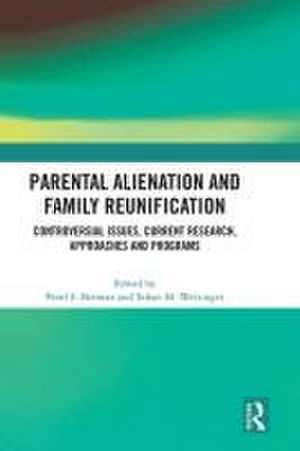Parental Alienation and Family Reunification: Controversial Issues, Current Research, Approaches and Programs
Editat de Pearl S. Berman, Ethan M. Weisingeren Limba Engleză Hardback – feb 2024
As laid out in the Child Welfare Information Gateway report, 2020, Family court judges should make decisions per the best interests of the child standard. High conflict custody cases make this complicated, especially when reunification services are requested. In the middle of contentious proceedings, judges oftentimes receive conflicting information from parents. Judges and family law professionals can be lead astray, relying on unproven constructs and instruments not meeting the criteria of reliability and validity. Mandating victimized children into reunification programs that are neither evidence-based nor trauma informed can cause further harm to the children.
This book will be of interest to those working in the family courts, particularly expert witnesses, clinical psychologists, therapists, children’s services workers including social workers, child protection court workers, mental health professionals involved in child custody decisions, and researchers with an interest in parental alienation. The chapters in this book were originally published as a special issue of Journal of Family Trauma, Child Custody & Child Development.
Preț: 1145.75 lei
Preț vechi: 1206.05 lei
-5% Nou
Puncte Express: 1719
Preț estimativ în valută:
219.34€ • 225.58$ • 181.97£
219.34€ • 225.58$ • 181.97£
Carte tipărită la comandă
Livrare economică 17 februarie-03 martie
Preluare comenzi: 021 569.72.76
Specificații
ISBN-13: 9781032641157
ISBN-10: 1032641150
Pagini: 248
Dimensiuni: 178 x 254 x 16 mm
Greutate: 0.62 kg
Ediția:1
Editura: Taylor & Francis
Colecția Routledge
Locul publicării:Oxford, United Kingdom
ISBN-10: 1032641150
Pagini: 248
Dimensiuni: 178 x 254 x 16 mm
Greutate: 0.62 kg
Ediția:1
Editura: Taylor & Francis
Colecția Routledge
Locul publicării:Oxford, United Kingdom
Public țintă
Postgraduate, Undergraduate Advanced, and Undergraduate CoreCuprins
Preface—Alienation and reunification issues in family courts: Theory, research, and programs in child custody cases Introduction—Parental alienation vs coercive control: Controversial issues and current research 1. Coercion in families and child resistance to contact with a parent after family separation 2. “He was the king of the house” children’s perspectives on the men who abused their mothers 3. Examining associations between psychological control and proactive and reactive aggression among middle school age youth 4. Perpetration of intimate partner violence and guilt: the role of parenting status 5. The Trouble with Harman and Lorandos’ Parental Alienation Allegations in Family Court Study (2020) 6. Attachment issues and reunification of parents and children 7. Parental sobriety and Parent-Child reunification in dependency court: Does the 15-month Adoption and Safe Families Act (ASFA) rule support parent-child reunification? 8. Reunification, alienation, or re-traumatization? Let’s start listening to the child 9. Reunification therapies for parental alienation: Tenets, empirical evidence, commonalities, and differences 10. How efficacious is Building Family Bridges? What the legal and mental health fields should know about Building Family Bridges and “parental alienation” 11. The “solution” to parental alienation: A critique of the turning points and overcoming barriers reunification programs
Notă biografică
Pearl S. Berman is Full Professor and the Chair of the Psychology Department at Indiana University of Pennsylvania, USA. She is also a licensed, clinical psychologist. Her longstanding interest in violence prevention has led her to integrate information and skill building relevant to interpersonal violence into all of her teaching at both the undergraduate and doctoral- level. She is the incoming Pennsylvania administrator for ChildFirst PA a forensic training program for first responders in cases of interpersonal violence. Berman has published doctoral- level textbooks for individuals in training to be psychologists, counselors, social workers, and therapists and has provided her research and clinical workshops nationally and internationally.
Ethan M. Weisinger is a California Certified Family Law Specialist in the San Francisco Bay Area and has practiced in family law for fourteen years. From 2010 to 2016, Ethan was a partner at Walnut Creek Family Law Center, Inc. In 2018, he founded Bay Area Family Law Center, Inc. a firm dedicated solely to the practice of family law. Ethan has lectured in the field of family law to both county and international bar associations. He served as an elected member of the Contra Costa County Bar Association, Family Law Section Board for five years. He has published articles in family law along with his monthly blog posts on family law issues. Presently, he represents clients in all conventional family law matters, as well as dissolution of Registered Domestic Partnerships and Same-Sex Marriages. Ethan also mediates and serves as a private judge in family law matters.
Ethan M. Weisinger is a California Certified Family Law Specialist in the San Francisco Bay Area and has practiced in family law for fourteen years. From 2010 to 2016, Ethan was a partner at Walnut Creek Family Law Center, Inc. In 2018, he founded Bay Area Family Law Center, Inc. a firm dedicated solely to the practice of family law. Ethan has lectured in the field of family law to both county and international bar associations. He served as an elected member of the Contra Costa County Bar Association, Family Law Section Board for five years. He has published articles in family law along with his monthly blog posts on family law issues. Presently, he represents clients in all conventional family law matters, as well as dissolution of Registered Domestic Partnerships and Same-Sex Marriages. Ethan also mediates and serves as a private judge in family law matters.
Descriere
This book on parental alienation and family reunification provides family court professionals with critical background in child development, dynamics present in violent families, and how to evaluate the testimony of experts to ensure it values children’s views, best interests of the children, and follows evidence-based practice.
